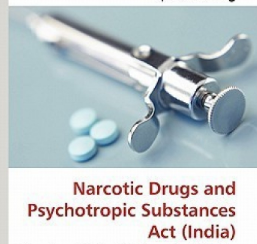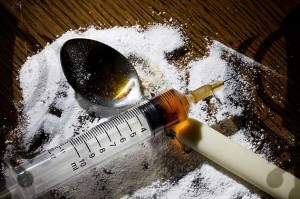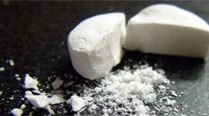In this blog post, Sreeraj K.V, a student of Government Law College, Ernakulam, Kerala analyses the Narcotic Drugs and Psychotropic Substances Act, 1985. This post covers areas like the importance of this Act in our country, certain provisions which regulate the usage of drugs as well as its possession and also possible remedies for overcoming substance abuse.
Introduction
India has a vast history in consumption of drugs and other substances of the same nature. There is a mention about the consumption of cannabis in the Atharvaveda. So we can state that the consumption of alcohol as well as dangerous drugs has been prevalent since the Vedic age.  One of the main reasons behind such widespread usage of drugs in India was that there were no special enactments for preventing people from the explicit usage of such substances except the Opium Act of 1857 and the Dangerous Drugs Act of 1930. The Narcotic Drugs and Psychotropic Substances Act, popularly known as NDPS Act, came into force on 14th November 1985.
One of the main reasons behind such widespread usage of drugs in India was that there were no special enactments for preventing people from the explicit usage of such substances except the Opium Act of 1857 and the Dangerous Drugs Act of 1930. The Narcotic Drugs and Psychotropic Substances Act, popularly known as NDPS Act, came into force on 14th November 1985.
The main intention behind the enactment of the Act was that till date there was no separate law for handling cases in connection with the explicit usage of drugs and other deadly substances enacted in India. The Act very effectively abolished the usage of dangerous drugs like cannabis, charas, and bhang and stopped its sales in India.
The Act abolishes the usage, production, cultivation or possession of any narcotic and psychotropic drugs and substances and it covers a wide area of operation as it applies to every citizen inside and outside India as well as persons working on ships and aircraft registered in India. Narcotic substances include all types of plant – based products such as opium, codeine and heroin and synthetic narcotics such as methadone and pethidine as well as cannabis, coca and cocaine.[1] Psychotropic substances include all such substances which affect the brain resulting in alterations in perceptions, mood, and consciousness.
Under one of the provisions of the Act, the Narcotics Control Bureau was set up to monitor the usage of such drugs regularly and for taking correctional steps against such cases. The Act also provides authority to the Central Government to take adequate measures to prevent the consumption of illicit drugs and its abuse. Section 8 of the Act provides for prohibition, control and regulation of certain operations such as production or cultivation of substances like coca plant, opium puppy or any cannabis plant inside India.
Article 47 of the Constitution of India provides the State to bring about the prohibition of certain intoxicating drinks and drugs which are injurious to health except for medical purposes. From this, it is clear that even before the enforcement of the Act, the Constitution made it well clear that consumption of such deadly substances will be held unlawful.
Importance of the Act
The importance of such an Act in the present Indian scenario is that there is a drastic pace in the usage of drugs and other narcotic substances mainly by teenagers.[2] This causes serious health issues like cancer, lung disorders, etc. As the Act provides various powers and duties to both the Central and State Government officials, it helps them to implement certain action plans for preventing the usage of certain drugs depending upon the consumption level of such drugs either district wise or state wise. The Act also classifies the quantity of the prohibited substances regarding small quantity and commercial quantity. The quantity for possessing the drugs is determined depending upon the nature and character of each one.
For instance, in the case of cocaine, the small quantity is 2 grams, and commercial quantity is 100 grams. But for Ganja, it is 1 kg and 20 kg respectively. The period of punishment also changes depending upon the quantity of drugs possessed. A person has to undergo one-year rigorous imprisonment along with fine if the drug possessed is of a smaller quantity and it may extend to a period of 20 years along with a fine for possession of a lot of drugs.[3]
The Act also provides provisions for the implementation of various Special Courts exclusively dealing with cases involving possession or consumption of any substances which falls under the Act. Even the Act has its power to award capital punishment in some special circumstances. In the year 2008, two persons were sentenced to death by NDPS Special Court in Mumbai and Ahmedabad.[4]
Amendments to the Act
Till date, the Act has been amended thrice, firstly in the year 1988 than in 2001 and lastly in the year 2014. The final amendment to the Act included various new provisions and regulations in the use of narcotic substances and psychotropic drugs. It also confers many additional duties to the concerned officials regarding the investigation and production of evidence. The main reason behind such amendments is that there will be rapid changes in the society towards the consumption of drugs; the Law must be updated in such a way that it makes necessary changes in the society.
There were landmark judgments in the cases regarding possession and consumption of narcotic drugs and illicit materials. One among them was Mohanlal v. State of Rajasthan[5], wherein the Court provided various definitions to the word ‘possession’. It was held that the word ‘possession’ includes two concepts; first, it includes all such actions involving physical control or corpus, and second it includes the element of animus, i.e., mental intention which has reference to the exercise of the said control[6]. This word has importance in the field of drug abuse as while consuming or possessing such drugs; people are unaware of the legal consequences of such acts when brought into the court of Law.
Power of the Court and Police
 The Act also provides certain powers to the court. A Metropolitan Magistrate or the Magistrate of the First class or any Magistrate of the second class of special courts specially empowered by the State Government in such cases, may issue a warrant against such persons whom he has reason to believe to have committed an offense coming under this Act. The Act also states that any person can be arrested or questioned by the appropriate authority without a warrant if there is a reason to doubt the accused. Section 42 of the Act states that an officer can legally search and arrest a person if he believes that the time required for a warrant will enable the person to hide or destroy such contraband. The officer should record such reasons before the search and inform the matter to his immediate superior within 72 hours. The Act also provides certain rights to the person who is being searched, i.e., right to have a Magistrate or Gazetted officer present during the time of search and the person must be informed of this right by the officer. A woman must be searched by another woman only (Section 50).
The Act also provides certain powers to the court. A Metropolitan Magistrate or the Magistrate of the First class or any Magistrate of the second class of special courts specially empowered by the State Government in such cases, may issue a warrant against such persons whom he has reason to believe to have committed an offense coming under this Act. The Act also states that any person can be arrested or questioned by the appropriate authority without a warrant if there is a reason to doubt the accused. Section 42 of the Act states that an officer can legally search and arrest a person if he believes that the time required for a warrant will enable the person to hide or destroy such contraband. The officer should record such reasons before the search and inform the matter to his immediate superior within 72 hours. The Act also provides certain rights to the person who is being searched, i.e., right to have a Magistrate or Gazetted officer present during the time of search and the person must be informed of this right by the officer. A woman must be searched by another woman only (Section 50).
Section 42 of the Act states that an officer can legally search and arrest a person if he believes that the time required for a warrant will enable the person to hide or destroy such contraband. The officer should record such reasons before the search and inform the matter to his immediate superior within 72 hours. The Act also provides certain rights to the person who is being searched, i.e., right to have a Magistrate or Gazetted officer present during the time of search and the person must be informed of this right by the officer. A woman must be searched by another woman only (Section 50).[7]
Conclusion
The importance of this Act in the present scenario is that nowadays we hear a lot about consumption of drugs and such other illicit substances. Even the Government took a brave step by banning all such drugs like HANS, KHAINI, etc. But people are still consuming such deadly substances as they are still available in the market. Another problem arising out of this issue is that even the school going children have started consuming such illicit substances with the help of many middlemen between them and the suppliers of such drugs. Such situations have to be handled by the concerned authorities and also by the parents so that they stop using such drugs. No actions can be adopted by the authorities if there is no public participation in such issues. People living in residential communities may arrange certain awareness programs and periodical inspections at the places where they feel there is a regular consumption of such products. People can also form various action committees for abolishing the explicit usage of such items from the society as such acts do not affect a person alone, but the society as a whole.
[divider]
Footnotes:
[1] Retrieved on: https://en.wikipedia.org/wiki/Narcotic
[2] Retrieved on:https://www.betterhealth.vic.gov.au/health/healthyliving/drugs-teenagers
[3] Retrieved on: http://idhdp.com/media/400258/idpc-briefing-paper_drug-policy-in-india.pdf
[4] Retrieved on: http://idhdp.com/media/400258/idpc-briefing-paper_drug-policy-in-india.pdf
[5] Mohanlal v. State of Rajasthan Criminal appeal number 1393 of 2010
[6] Retrieved on http://supremecourtofindia.nic.in/FileServer/2015-04-17_1429263295.pdf
[7] Section 42, 50 – NDPS ACT 1985. Retrieved on: http://blog.mylaw.net/tag/ndps-act/
 Serato DJ Crack 2025Serato DJ PRO Crack
Serato DJ Crack 2025Serato DJ PRO Crack









 Allow notifications
Allow notifications


